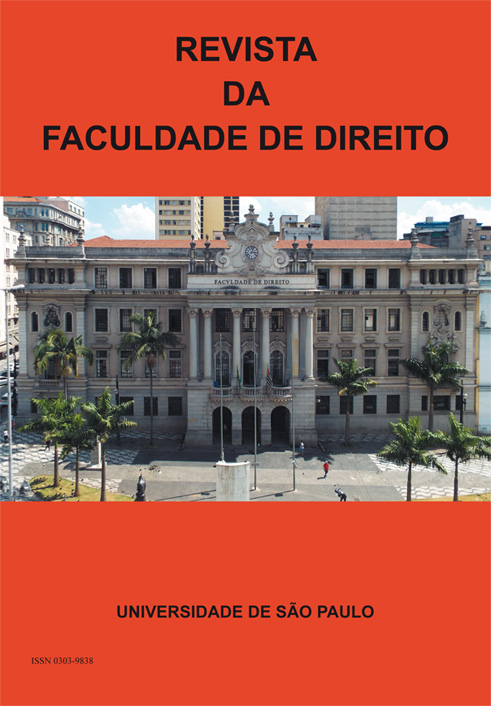A afirmação do direito internacional público em contextos de crise global
DOI:
https://doi.org/10.11606/issn.2318-8235.v115p247-271Palavras-chave:
Direito Internacional, Direito Internacional Público, Crise global, Pandemia, Covid-19Resumo
A reflexão acadêmica em torno do impacto, para a sociedade mundial, da crise decorrente da disseminação global do novo coronavírus (Sars-CoV-2) e da doença por ele causada (Covid-19) tem levado a diversos e distintos cenários imaginados para a pós-pandemia. Por meio da consideração da evolução histórica de seu acervo normativo e de seus institutos, o direito internacional público apresenta elementos que podem contribuir para essa reflexão. Uma das decorrências das crises globais tem sido justamente a afirmação do direito internacional público como ambiente privilegiado para a fixação de paradigmas voltados a orientar a sociedade mundial na reconfiguração de seu funcionamento, em um contexto inexorável de maior integração. Na sequência de cada crise global – dado o impacto geograficamente amplo da crise e a necessidade de se lograr, face ao risco a ela imanente, estabilidade na ordem internacional –, deram-se, para além de qualquer motivação idealista, o fortalecimento do multilateralismo e a expansão do direito internacional público. A aferição dessa correlação pode ser feita pela análise das transformações vivenciadas pelo direito internacional público na esteira tanto de crises globais generalizadas, marcadas pelo colapso da segurança internacional, como de crises globais tópicas, da qual é exemplo a crise sanitária desencadeada pela pandemia da Covid-19. A compreensão do risco para a estabilidade mundial que esta pandemia acarreta fará com que importantes temas que ficaram estagnados nos últimos anos – o aquecimento global, a vulnerabilidade social, as assimetrias na economia internacional – tenham que voltar à pauta de negociação de um multilateralismo renovado, gerando novo impulso na evolução do direito internacional público.
Downloads
Referências
ALVAREZ, José Enrique. International organizations as law-makers. Oxford: Oxford University Press, 2006.
BECKER, Jean-Jacques. O Tratado de Versalhes. Tradução de Constancia Egrejas. São Paulo: Editora Unesp, 2011.
BRASIL. Decreto n. 13.990, de 12 de janeiro de 1920. Promulga o Tratado de Paz entre os países aliados, associados e o Brasil de um lado e de outro a Alemanha, assinado em Versailles em 28 de junho de 1919. Portal do Planalto, Brasília, DF, jan. 1920. Disponível em: http://www.planalto.gov.br/ccivil_03/decreto/1910-1929/D13990.htm.
BRASIL. Decreto n. 19.841, de 22 de outubro de 1945. Promulga a Carta das Nações Unidas, da qual faz parte integrante o anexo Estatuto da Corte Internacional de Justiça, assinada em São Francisco, a 26 de junho de 1945, por ocasião da Conferência de Organização Internacional das Nações Unidas. Portal do Planalto, Brasília, DF, out. 1945. Disponível em: http://www.planalto.gov.br/ccivil_03/decreto/1930-1949/D19841.htm.
CARVALHO, Patrícia Luciane de. O acesso a medicamentos e as patentes farmacêuticas na ordem jurídica brasileira. Revista CEJ, Brasília, v. 11, n. 37, p. 94-102, abr./jun. 2007. Disponível em: https://revistacej.cjf.jus.br/revcej/article/view/880/1062. Acesso em: 16 ago. 2020.
CASELLA, Paulo Borba. Tratado de Versalhes na história do direito internacional. São Paulo: Quartier Latin, 2007.
COSTA, José Augusto Fontoura. Normas de direito internacional: aplicação uniforme do direito uniforme. São Paulo: Atlas, 2000.
DALLARI, Pedro Bohomoletz de Abreu. Desenvolvimento sustentável em favor da justiça social no Brasil. In: PÁDUA, José Augusto (org.). Desenvolvimento, justiça e meio ambiente. Belo Horizonte: Ed. UFMG; São Paulo: Ed. Peirópolis, 2009. p. 254-275. Disponível em: https://www.israelpinheiro.org.br/wp-content/uploads/2016/11/desenvolvimentojusticameioambiente.pdf. Acesso em: 16 ago. 2020.
DALLARI, Pedro Bohomoletz de Abreu. The integration of the law in a politically fragmented world. In: VASCONCELOS, Álvaro (org.). Brasil nas ondas do mundo. Coimbra: Imprensa da Universidade de Coimbra, 2017. p. 41-49. Disponível em: http://www.iea.usp.br/noticias/documentos/livro-brasil-nas-ondas-do-mundo. Acesso em: 16 ago. 2020.
DUPUY, Pierre-Marie. Droit international public. 8e. éd. Paris: Dalloz, 2006.
GARCIA, Eugênio Vargas. O Brasil e a Liga das Nações (1919-1926): vencer ou não perder. Porto Alegre: Editora da UFRGS; Brasília: FUNAG, 2005.
HEGEL, Georg Wilhelm Friedrich. Princípios da filosofia do direito. 2. ed. Lisboa: Livraria Martins Fontes, 1976. (Coleção filosofia e ensaios).
KELSEN, Hans. Les rapports de système entre le droit interne et le droit international public. Recueil des Cours de l’Académie de Droit International de La Haye, Paris, v. 14, n. 4, p. 227-331, 1927.
LAFER, Celso. Comércio, desarmamento, direitos humanos: reflexões sobre uma experiência diplomática. São Paulo: Paz e Terra, 1999.
MACMILLAN, Margaret. Paris 1919: six months that changed the world. Nova York: Random House, 2003.
MOMTAZ, Djamchid. Le droit international humanitaire applicable aux conflits armés non internationaux. Recueil des Cours de l’Académie de Droit International de La Haye, Leiden/Boston, MA, v. 292, p. 9-146, 2001.
ORGANIZACIÓN MUNDIAL DEL COMERCIO. Declaración relativa al acuerdo sobre los ADPIC y la salud pública. Doha, 9-14 nov. 2001. Disponível em: https://www.wto.org/spanish/thewto_s/minist_s/min01_s/mindecl_trips_s.pdf. Acesso em: 16 ago. 2020.
POLONIO, Carlos Alberto. Proteção jurídica das patentes farmacêuticas no Brasil e sua adequação ao acordo TRIPS: direito à saúde e acesso a medicamentos. 2006. 238 f. Dissertação (Mestrado) –Faculdade de Direito, Universidade de São Paulo, São Paulo, 2006.
SCHLESINGER, Stephen C. Act of creation: the founding of the United Nations. Cambridge, MA: Westview Press, 2004.
TOMUSCHAT, Christian. International law: ensuring the survival of mankind on the eve of a new century – general course on public international law. Recueil des Cours de l’Académie de Droit International de La Haye, Leiden/Boston, MA, v. 281, p. 9-438, 1999.
UNIÃO EUROPEIA. Conselho Europeu. Reunião extraordinária do Conselho Europeu. Conclusões. Bruxelas, 17-21 jul. 2020. Disponível em: https://www.consilium.europa.eu/media/45120/210720-euco-final-conclusions-pt.pdf. Acesso em: 16 ago. 2020.
VENTURA, Deisy de Freitas Lima. Da emergência de um direito ao direito de emergência: o caso da pandemia da gripe A (H1N1) 2009-2010. 2012. Tese (Livre-docência) – Instituto de Relações Internacionais, Universidade de São Paulo, São Paulo, 2012.
Downloads
Publicado
Edição
Seção
Licença
Copyright (c) 2020 Revista da Faculdade de Direito, Universidade de São Paulo

Este trabalho está licenciado sob uma licença Creative Commons Attribution-NonCommercial-ShareAlike 4.0 International License.


